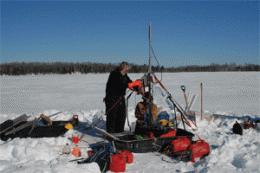Geologists Study Historic Patterns of Climate Change

(PhysOrg.com) -- University of Cincinnati geologist Tom Lowell is part of a team studying the effects of melting ancient glaciers. The research has implications for global warming, as published this week in Science Express.
Tom Lowell is scared of what his latest research suggests.
Lowell, a professor of geology in the McMicken College of Arts and Sciences at the University of Cincinnati, is part of a team that for years has been researching the melting of ice sheets along what is now the border between Canada and the United States around the Great Lakes region.
The group’s latest results are being published this week in Science Express as “Freshwater Outburst from Lake Superior as a Trigger for the Cold Event 9,300 Years Ago,” by Shi-Yong Yu, Steven Colman, Lowell, Glenn Milne, Timothy Fisher, Andy Breckenridge, Matthew Boyd and James Teller. The international team represents the University of Minnesota, Tulane University, UC, the University of Ottawa, the University of Toledo, Mercyhurst College, Lakehead University and the University of Manitoba.
Climate records show that about 9,300 years ago, the Northern Hemisphere experienced a massive cooling event. It has been unknown what caused this — until now.
In the paper, the authors note that 9,300 years ago, Earth’s climate was very unstable. The North Atlantic Ocean experienced a sudden drop of temperature of about 2° C (3.6° F).
"We looked at what Lake Superior was doing 9,3000 years ago and found a sudden drop in lake level,” says Lowell. “So we suggested that the lake supplied fresh water to the oceans, which altered ocean circulation.”
This work is part of a general theme of the research working on the effects of the melting of the ice sheet. “How large or fast must the melting be to perturb the ocean enough to cause climate change?” asks Lowell.
What concerns Lowell are the potential parallels between those prehistoric events and current climate change.
“Could future global warming be significant enough that the melting of the Greenland ice sheet might also cause perturbation in the ocean?” he asks.
“The question is, did it happen?” Lowell adds. He notes that there is a time correlation between sample cores in the Lake Superior/St. Lawrence River samples and the Greenland sample cores
“But is it correlative, causative or coincidental?” he asks. “We don’t know yet. More research is needed.”
This research, as is other research of Lowell’s, was funded by the Comer Science and Education Foundation. Gary Comer, the founder of Lands’ End, after retirement sailed the Northwest Passage in his private yacht.
Lowell says, “Mr. Comer asked himself, ‘Why could I do this when the old-timers couldn’t?’ and he realized that we needed to do something about climate change. So he came to the scientists for answers.”
Lowell stresses that studying the ancient past, as he is, is one way of helping us prepare for the future. But it’s going to take more direct actions, perhaps in the form of geoengineering, to slay the dragon of global warming.
“It’s not going to be enough to conserve our way out,” says Lowell. “Our concern is not whether climate change is going to happen in our children’s lives; it’s how much and what can they live with.”
More information: Paper: www.sciencemag.org/cgi/content … ract/science.1187860
Provided by University of Cincinnati


















